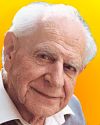 (source)
(source)
|
Karl Raimund Popper
(28 Jul 1902 - 17 Sep 1994)
Austrian-British philosopher of science remembered for his writings on theory of scientific method.
|
Karl Raimund Popper Quotes on Scientific Method (5 quotes)
>> Click for 42 Science Quotes by Karl Raimund Popper
>> Click for Karl Raimund Popper Quotes on | Criticism | Falsification | Idea | Knowledge | Refutation | Science | Test | Theory | Truth |
>> Click for 42 Science Quotes by Karl Raimund Popper
>> Click for Karl Raimund Popper Quotes on | Criticism | Falsification | Idea | Knowledge | Refutation | Science | Test | Theory | Truth |
[The aim of science is] to explain what so far has taken to be an explicans, such as a law of nature. The task of empirical science constantly renews itself. We may go on forever, proceeding to explanations of a higher and higher universality…
— Karl Raimund Popper
"The Aim of Science', Ratio 1 (1958), 26. Quoted in Erhard Scheibe and Brigitte Falkenburg (ed), Between Rationalism and Empiricism: Selected Papers in the Philosophy of Physics (2001), 238
A principle of induction would be a statement with the help of which we could put inductive inferences into a logically acceptable form. In the eyes of the upholders of inductive logic, a principle of induction is of supreme importance for scientific method: “... this principle”, says Reichenbach, “determines the truth of scientific theories. To eliminate it from science would mean nothing less than to deprive science of the power to decide the truth or falsity of its theories. Without it, clearly, science would no longer have the right to distinguish its theories from the fanciful and arbitrary creations of the poet’s mind.” Now this principle of induction cannot be a purely logical truth like a tautology or an analytic statement. Indeed, if there were such a thing as a purely logical principle of induction, there would be no problem of induction; for in this case, all inductive inferences would have to be regarded as purely logical or tautological transformations, just like inferences in inductive logic. Thus the principle of induction must be a synthetic statement; that is, a statement whose negation is not self-contradictory but logically possible. So the question arises why such a principle should be accepted at all, and how we can justify its acceptance on rational grounds.
— Karl Raimund Popper
…...
A system such as classical mechanics may be ‘scientific’ to any degree you like; but those who uphold it dogmatically — believing, perhaps, that it is their business to defend such a successful system against criticism as long as it is not conclusively disproved — are adopting the very reverse of that critical attitude which in my view is the proper one for the scientist.
— Karl Raimund Popper
In The Logic of Scientific Discovery (1959, reprint 2002), 28.
It is the rule which says that the other rules of scientific procedure must be designed in such a way that they do not protect any statement in science against falsification. (1959)
— Karl Raimund Popper
The Logic of Scientific Discovery: Logik Der Forschung (2002), 33.
The method of science depends on our attempts to describe the world with simple theories: theories that are complex may become untestable, even if they happen to be true. Science may be described as the art of systematic over-simplification—the art of discerning what we may with advantage omit.
— Karl Raimund Popper
Karl Raimund Popper and William Warren Bartley (ed.), The Open Universe: an Argument for Indeterminism (1991), 44.
by Karl Raimund Popper, William Warren Bartley - Science - 1991
See also:
- 28 Jul - short biography, births, deaths and events on date of Popper's birth.
 In science it often happens that scientists say, 'You know that's a really good argument; my position is mistaken,' and then they would actually change their minds and you never hear that old view from them again. They really do it. It doesn't happen as often as it should, because scientists are human and change is sometimes painful. But it happens every day. I cannot recall the last time something like that happened in politics or religion.
(1987) --
In science it often happens that scientists say, 'You know that's a really good argument; my position is mistaken,' and then they would actually change their minds and you never hear that old view from them again. They really do it. It doesn't happen as often as it should, because scientists are human and change is sometimes painful. But it happens every day. I cannot recall the last time something like that happened in politics or religion.
(1987) -- 


